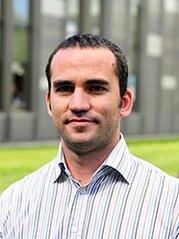
Williams Miranda
Oct. 15, 2018
Williams hails from a family of medical doctors and was introduced to biology at a very early age. His parents encouraged him to watch nature documentaries, always ask questions, and approach the world with a sense of curiosity. It was during his high school years that he fell in love with science and began to wonder about the molecular basis of life and disease. He credits his chemistry and biology teachers, who made such a positive impact on him, with his decision to pursue a biochemistry degree at the University of Havana.

Williams Miranda
While an undergraduate student Williams was introduced to Computational Biology by Dr. Valiente’s research surrounding novel antimalarial drugs using computational methods. Williams feels that this experience helped him realize for the first time “That using computer simulations could be helpful in finding new drugs and cures” and that these advances “amazed [him]”. Part of Williams interest in computational biology is because it is a multidisciplinary field – combining the knowledge of biology, chemistry, math, physics and computer science. After having been amazed at the possibilities of Computational Biology, Williams continued with his pursuit of finding health solutions using computer simulations.
During his MSc, Williams reached out to Dr. Noskov who is a pioneer in the field of Computational Biology and the Associate Director of the Centre for Molecular Simulation at the University of Calgary. Williams was then invited to participate in Dr.Noskov’s lab and was The Emerging Leaders in the Americas Program (ELAP) scholarship from the Government of Canada. This is an award that provides students from Latin America and the Caribbean with short-term exchange opportunities in Canada. Williams's time in the Noskov lab was successful and after defending his MSc in Cuba he returned to Calgary to pursue a PhD.
In the Noskov lab Williams’s research prioritizes the molecular mechanisms responsible for heart arrhythmias. These arrhythmias can be triggered by the effects of mutations, drugs, and cell membrane lipids on the activity of cardiac ion channels. Molecular dynamic simulations factor nicely into research done on heart arrhythmias because the current experimental methods have a limited resolution, which is an issue helped by using computer models and the modern advances in Computational Biology. Using computer models to simulate molecular dynamics allows for resolution at the atomic level and provides a clearer understanding of the underlying mechanisms associated with Williams’s research. These computer simulations can help explain why some ion channels are blocked by almost every kind of commonly prescribed medication. This is an issue of extreme importance because if researchers know precisely how ion channels are blocked, safer prescription drugs can be developed. The importance of this research cannot be understated as heart disease can lead to a lower quality of life and around 15% of global deaths are related to heart arrhythmias. By pursuing this study Williams is contributing to world class molecular simulation research and is helping to shed light on the potential causes and treatment of these issues.
Currently Williams is in his 3rd year of his PhD, and thus far has an outstanding five publications, four of them as first author. Through his hard work and perseverance, he was awarded the Alberta Innovates Health Solutions (AIHS) scholarship in 2016, Vanier in 2017, and the prestigious Killam Scholarship earlier this year. Williams attributes his success to inspiring leadership from Dr. Noskov, supportive colleagues and lab mates, and a fantastic research environment at the Centre for Molecular Simulation in the Department of Biological Sciences. Williams notes that he is in the perfect environment to achieve his future goals, and believes that "I'm here through a mixture of good luck and a lot of effort". Along with his hard work Williams praises the Canadian system for granting opportunities to international students who are interested in research and believes that “Overall, I think science, and exploring human capabilities is amazing. It’s interesting to think about how far we humans have advanced, and how far we will continue to advance in our knowledge about nature”.
As a teaching assistant, he has enjoyed interacting with students and the different perspectives that teaching provides and feels “while teaching someone, you are teaching yourself.” In fact, Williams and his wife, who is also a PhD candidate at the UofC, are already teaching the next generation of scientists through their "A Little Big Mind" program, which introduces young children to science through fun activities at his daughter’s daycare. Williams would like to stay in academia as it will allow him to continue to pursue his love of research and teaching.
Williams and his family are very much enjoying Canadian hospitality, with the exception of experiencing -30 degrees Celsius for the first time, which we can all agree takes some getting used to.
A Story By Anna Urbanska